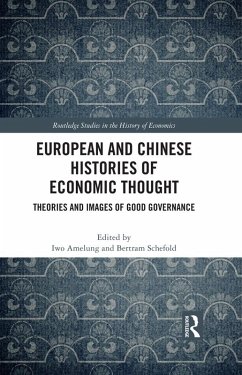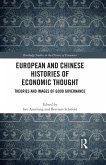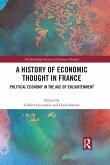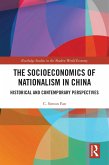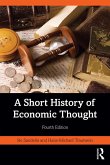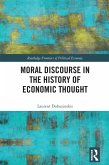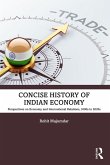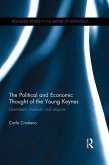European and Chinese Histories of Economic Thought (eBook, PDF)
Theories and Images of Good Governance
Redaktion: Amelung, Iwo; Schefold, Bertram
43,95 €
43,95 €
inkl. MwSt.
Sofort per Download lieferbar

22 °P sammeln
43,95 €
Als Download kaufen

43,95 €
inkl. MwSt.
Sofort per Download lieferbar

22 °P sammeln
Jetzt verschenken
Alle Infos zum eBook verschenken
43,95 €
inkl. MwSt.
Sofort per Download lieferbar
Alle Infos zum eBook verschenken

22 °P sammeln
European and Chinese Histories of Economic Thought (eBook, PDF)
Theories and Images of Good Governance
Redaktion: Amelung, Iwo; Schefold, Bertram
- Format: PDF
- Merkliste
- Auf die Merkliste
- Bewerten Bewerten
- Teilen
- Produkt teilen
- Produkterinnerung
- Produkterinnerung

Bitte loggen Sie sich zunächst in Ihr Kundenkonto ein oder registrieren Sie sich bei
bücher.de, um das eBook-Abo tolino select nutzen zu können.
Hier können Sie sich einloggen
Hier können Sie sich einloggen
Sie sind bereits eingeloggt. Klicken Sie auf 2. tolino select Abo, um fortzufahren.

Bitte loggen Sie sich zunächst in Ihr Kundenkonto ein oder registrieren Sie sich bei bücher.de, um das eBook-Abo tolino select nutzen zu können.
This pioneering book brings together Western and Chinese scholars to reflect on the historical evolution of economic thought in Europe and China.
- Geräte: PC
- mit Kopierschutz
- eBook Hilfe
Andere Kunden interessierten sich auch für
![European and Chinese Histories of Economic Thought (eBook, ePUB) European and Chinese Histories of Economic Thought (eBook, ePUB)]() European and Chinese Histories of Economic Thought (eBook, ePUB)43,95 €
European and Chinese Histories of Economic Thought (eBook, ePUB)43,95 €![A History of Economic Thought in France (eBook, PDF) A History of Economic Thought in France (eBook, PDF)]() A History of Economic Thought in France (eBook, PDF)41,95 €
A History of Economic Thought in France (eBook, PDF)41,95 €![The Socioeconomics of Nationalism in China (eBook, PDF) The Socioeconomics of Nationalism in China (eBook, PDF)]() C. Simon FanThe Socioeconomics of Nationalism in China (eBook, PDF)43,95 €
C. Simon FanThe Socioeconomics of Nationalism in China (eBook, PDF)43,95 €![A Short History of Economic Thought (eBook, PDF) A Short History of Economic Thought (eBook, PDF)]() Bo SandelinA Short History of Economic Thought (eBook, PDF)23,95 €
Bo SandelinA Short History of Economic Thought (eBook, PDF)23,95 €![Moral Discourse in the History of Economic Thought (eBook, PDF) Moral Discourse in the History of Economic Thought (eBook, PDF)]() Laurent DobuzinskisMoral Discourse in the History of Economic Thought (eBook, PDF)43,95 €
Laurent DobuzinskisMoral Discourse in the History of Economic Thought (eBook, PDF)43,95 €![Concise History of Indian Economy (eBook, PDF) Concise History of Indian Economy (eBook, PDF)]() Rohit MajumdarConcise History of Indian Economy (eBook, PDF)41,95 €
Rohit MajumdarConcise History of Indian Economy (eBook, PDF)41,95 €![The Political and Economic Thought of the Young Keynes (eBook, PDF) The Political and Economic Thought of the Young Keynes (eBook, PDF)]() Carlo CristianoThe Political and Economic Thought of the Young Keynes (eBook, PDF)41,95 €
Carlo CristianoThe Political and Economic Thought of the Young Keynes (eBook, PDF)41,95 €-
-
-
This pioneering book brings together Western and Chinese scholars to reflect on the historical evolution of economic thought in Europe and China.
Dieser Download kann aus rechtlichen Gründen nur mit Rechnungsadresse in A, B, BG, CY, CZ, D, DK, EW, E, FIN, F, GR, HR, H, IRL, I, LT, L, LR, M, NL, PL, P, R, S, SLO, SK ausgeliefert werden.
Produktdetails
- Produktdetails
- Verlag: Taylor & Francis
- Seitenzahl: 328
- Erscheinungstermin: 17. November 2021
- Englisch
- ISBN-13: 9781000478990
- Artikelnr.: 62613547
- Verlag: Taylor & Francis
- Seitenzahl: 328
- Erscheinungstermin: 17. November 2021
- Englisch
- ISBN-13: 9781000478990
- Artikelnr.: 62613547
- Herstellerkennzeichnung Die Herstellerinformationen sind derzeit nicht verfügbar.
Iwo Amelung is Professor at Goethe University, Frankfurt am Main, Germany. His research interests are: history of knowledge of modern China, bureaucracy and social history of the Qing period, emergence and development of scientific disciplines in modern China. Bertram Schefold is Senior Professor at Goethe University, Frankfurt am Main, Germany. He teaches economic theory and history of economic thought. His research interests are: Capital theory, history of economic thought and development.
Part I: Chinese Lines of Evolution Section 1: The Agency of the State 1. People's Livelihoods and Good Governance in the Past and for the Future 2. Justifying Office-selling for Famine Relief in Nineteenth-century Qing China 3. The Cost of Security: Financing Yellow River Hydraulics During the Late Imperial Period Section 2: Land, Interest and Usury 4. Outline of the Institutions for Land Transactions in Traditional China 5. Loans and Interest Rates in Traditional China 6. The Progression of Foreign Currencies in Ancient China Part II: European Lines of Evolution Section 1: From Rationalisations of Usury to Deductive Theories of Interest 7. Theorizing Interest: How Did It All Begin? Some Landmarks on the Prohibition of Usury in Scholastic Economic Thought 8. Merchants and the New Catholic View on the Economy: Florence and Augsburg Between the 15th and the 16th Century 9. From Kaspar Klock's "De aerario" (1651) and Leibniz's "Meditatio de interusurio simplice" to Florencourt's "Abhandlungen aus der juristischen und der politischen Rechenkunst" (1781): How Calculus Led from the Logic of a Device for Circumventing the Prohibition of Usury to a Modern Theory of Depreciation 10. Interest on Money, Own Rate of Interest, the Natural Interest Rate and the Rate of Profits: A short History of Concepts - Ultimately Emerging from the Usury Debate Section 2: The Spread of Monetary Relations and the Transition from Poor Relief to the Welfare State 11. Labour and Poverty in Medieval and Early Modern Europe 12. After China, before Sweden and England: the Circulation of Paper Money in Naples 13. European Models and Transformations of the Welfare State Part III: Contact, Comparison and Interaction Section 1: Before the Revolutions 14. Xunzi and Plato on the Economics of Totalitarianism: A Meeting of Distant Minds 15. Yantie Lun in the Pro-legalist and Anti-Confucian Campaign 16. A Critical Examination of Chinese Influences on Quesnay Section 2: The Traces of the Past in the Transition to Modernity 17. Rethinking Traditional Attitudes Towards Consumption in the Process of Formation of Chinese Economics (Late Qing and Republican Period) 18. China's Ancient Principles of Price Regulation through Market Participation: The Guanzi from a Comparative Perspective 19. Confucian Entrepreneurship and Moral Guidelines for Business in China Part IV: Conclusions and Perspectives 20. Towards a Systematic Comparison of Different Forms of Economic Thought
Part I: Chinese Lines of Evolution Section 1: The Agency of the State 1. People's Livelihoods and Good Governance in the Past and for the Future 2. Justifying Office-selling for Famine Relief in Nineteenth-century Qing China 3. The Cost of Security: Financing Yellow River Hydraulics During the Late Imperial Period Section 2: Land, Interest and Usury 4. Outline of the Institutions for Land Transactions in Traditional China 5. Loans and Interest Rates in Traditional China 6. The Progression of Foreign Currencies in Ancient China Part II: European Lines of Evolution Section 1: From Rationalisations of Usury to Deductive Theories of Interest 7. Theorizing Interest: How Did It All Begin? Some Landmarks on the Prohibition of Usury in Scholastic Economic Thought 8. Merchants and the New Catholic View on the Economy: Florence and Augsburg Between the 15th and the 16th Century 9. From Kaspar Klock's "De aerario" (1651) and Leibniz's "Meditatio de interusurio simplice" to Florencourt's "Abhandlungen aus der juristischen und der politischen Rechenkunst" (1781): How Calculus Led from the Logic of a Device for Circumventing the Prohibition of Usury to a Modern Theory of Depreciation 10. Interest on Money, Own Rate of Interest, the Natural Interest Rate and the Rate of Profits: A short History of Concepts - Ultimately Emerging from the Usury Debate Section 2: The Spread of Monetary Relations and the Transition from Poor Relief to the Welfare State 11. Labour and Poverty in Medieval and Early Modern Europe 12. After China, before Sweden and England: the Circulation of Paper Money in Naples 13. European Models and Transformations of the Welfare State Part III: Contact, Comparison and Interaction Section 1: Before the Revolutions 14. Xunzi and Plato on the Economics of Totalitarianism: A Meeting of Distant Minds 15. Yantie Lun in the Pro-legalist and Anti-Confucian Campaign 16. A Critical Examination of Chinese Influences on Quesnay Section 2: The Traces of the Past in the Transition to Modernity 17. Rethinking Traditional Attitudes Towards Consumption in the Process of Formation of Chinese Economics (Late Qing and Republican Period) 18. China's Ancient Principles of Price Regulation through Market Participation: The Guanzi from a Comparative Perspective 19. Confucian Entrepreneurship and Moral Guidelines for Business in China Part IV: Conclusions and Perspectives 20. Towards a Systematic Comparison of Different Forms of Economic Thought
"I expected this book to shed light on the interactions, similarities, and conflicts between European and Chinese ideas. I am happy to report that it met my expectations...[T]his book is a great starter for comparison research in the development of economic thought across civilizations."
Yue Xiao, History of Political Economy
Yue Xiao, History of Political Economy
